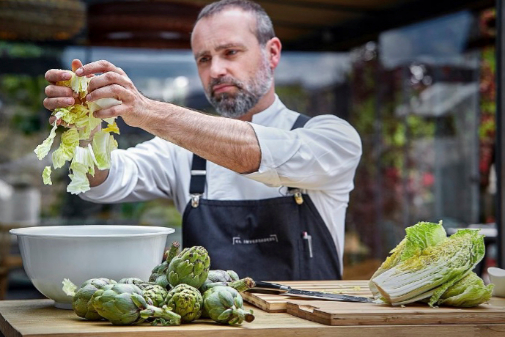- Vegetables and legumes: why Spain was vegan before vegan fashion
- File.Read more recommendations of El Gastronómada
We started, in Spain, more than 30 years ago with vegetarian restaurants , few and of little gastronomic fame, like that of the Madrid street of Manuela Malasaña. The category has grown and diversified over time, although perhaps more slowly than in other countries with more environmental awareness: we already have them organic or zero kilometer, for example. But the big changes have not yet come. And they will arrive: a lot of controversy, but in the post-Greta Thunberg world, food, like everything else, is in question. And one wonders if the concept of eating well will mean the same in our country as now.
In fact, that concept has evolved steadily since economic progress and purchasing power strengthened in Spain half a century ago. But all this remains small next to what we have around the corner.
A few weeks ago we read with interest the analysis of Jennifer Chait, one of the experts / activists on the evolution of restaurants in the United States -a matter very often there-, and it is clear that the change will go much further than mere insistence on natural products .
Suddenly, there success has focused on organic products, with the least intervention of chemical agents, but the new ecological awareness goes further: it insists on eco-friendly products, that is, they protect the environment. And it turns out that not everything organic or natural does. And there are questions about the dairy industry and, more broadly, about intensive livestock and its supposed negative effects on the atmosphere.
Awareness of the matter has advanced so much in America that a majority of customers, according to surveys, think that the combination of organic and pro-environment is preferable to one of the two categories separately , and two-thirds of the clientele potential is willing to pay much more in an ecological restaurant than in another that only offers the natural or organic.
And here comes the next word that we will have to get used to: sustainability. Young fans and gourmet do not take it lightly. A favorable element to this sustainability is generally the proximity of the origin of the products. Unfavorable is the animal origin of proteins, and there we have those calls, already constant, to reduce our consumption of meats. Fish, for now - perhaps it is resolved with the growth of aquaculture - cannot be certified as organic, but at least the most threatened species must be avoided.
It is curious how seemingly small details are contributing to attract the new public with environmental awareness: at breakfast, if the jams are homemade they will be much more attractive than if they come from a store ...
Not to mention even using genetically modified foods (tomatoes and many others) and that this fact is recognizable by the client: Vade retro, Satan!
Let's see a few more of the advice that the innkeepers of the advanced Anglo-Saxon countries receive today and that will soon be spread everywhere, which will have to get used to:
Water saving is essential , from low-flow faucets in services to the irrigation of decorative plants. So is the reduction of all kinds of waste , particularly food (donating the leftovers to social canteens or making compost for use in the garden with part of those leftovers). You have to recycle everything that can be recycled , avoid paper (including napkins and paper towels). And you have to use energy with great efficiency , with effective devices that do not waste it and without abusing heating or air conditioning.
Of course, all this must be made known. The American analyst explains:
"Going the organic or green way is fine, but if you don't tell the customers, they may not know. Many green practices are things you can't see, so be sure to inform them that you are doing everything possible to protect the environment Offer recycled paper pamphlets that explain what they are doing, and list all these actions on their website, include their ecological practices in all their marketing actions, especially in social networks, and hold events like Earth Day in his restaurant. "
Even so, the demands on the origin and the carbon impact of the products used are not yet as clearly explained as that of not using paper. The very Nordic and ecological restaurant Noma in Copenhagen has long boasted only using Scandinavian products ... but it included some of them from Greenland , which is on the other side of the ocean and they are not precisely kilometer zero.
In Spain we have interesting and original initiatives, which we will see if they are spreading or not: whoever goes to Rodrigo de la Calle's Greenhouse in Madrid will be immersed in a vegetable regime, and also in large part of their own production within walking distance. In El Puerto de Santa María, the work of Ángel León with lesser known marine resources, and not only plankton, is exciting, but it can still lead to some kind of overexploitation.
Anyway: follow it closely. This is changing every day, and it is no longer for anyone. There is a snob element in much of it, but there is also an unavoidable reality, and this is the one that will count most in the future.
According to the criteria of The Trust Project
Know more- The Gourmet
- Gastronomy
- Greta Thunberg
The gastronomic Why we have to toast with wine in December, in January and beyond
El GastronómadaDe Maravillas a Mostenses: route through the gastronomic secrets of the Madrid markets
Out of series Heart and duck tongue with reindeer gizzards: the wild follies of a kitchen number one

